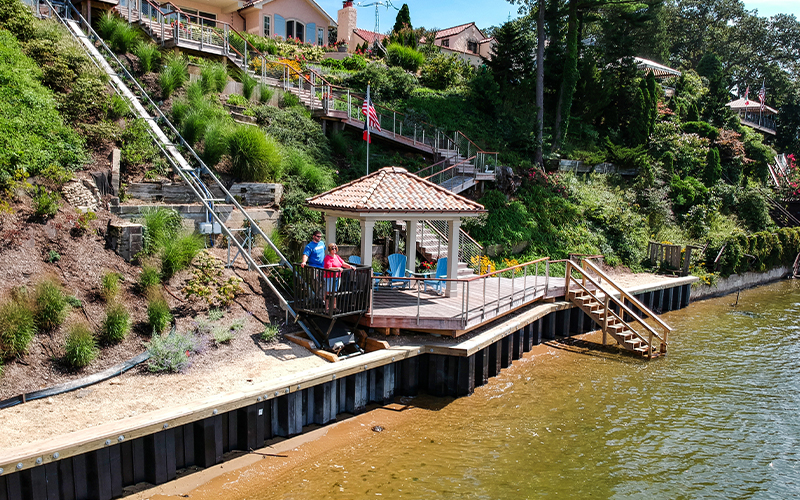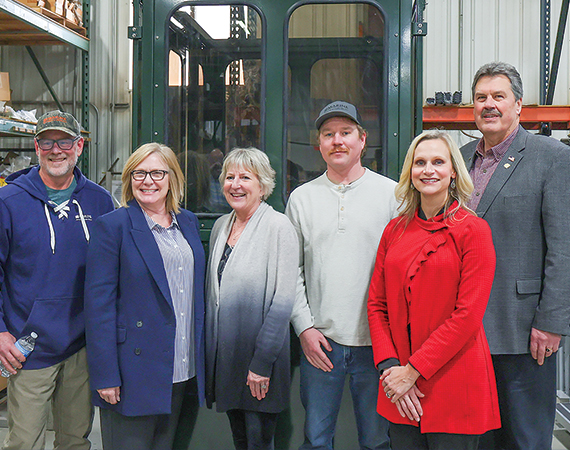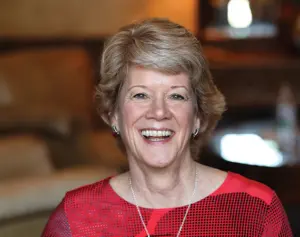Leaders at a Detroit Lakes-area manufacturer got a chance to air their frustrations and concerns to lawmakers earlier this year.
The Botzet family, who have owned Marine Innovations for decades, met in January with U.S. Rep. Michelle Fischbach, a Republican who represents the bulk of western Minnesota in Washington, D.C., as well as fellow state GOP legislators Sen. Paul Utke and Rep. Krista Knudsen, who represent the area in the Minnesota Legislature. At the company’s shop in Frazee, Minn., the Botzets told the lawmakers about their company’s struggles with supply chain issues and state regulations.
The point of the visit was, ultimately, to emphasize how important rural manufacturing is to the health of small towns, according to Lori Botzet, the company’s vice president. Botzet arranged the meeting.
“If any factories aren’t going to do well, then retailers aren’t going to do well,” Botzet says. “It’s nice to visit the city council, but the state needs to focus on protecting the manufacturers because that is what’s going to make small towns thrive.”
Marine Innovations workers produce and install “inclined” elevators meant to haul people and equipment from, for instance, a lakeside cabin at the top of a hill to a dock at the bottom and back again. The company has installed lifts in 38 U.S. states and abroad: an aquifer in Hawaii, marinas in Texas, and even acclaimed director Francis Ford Coppola’s resort in Guatemala.
“Wherever there’s a hill and a need to get people up,” Botzet says. “We’re all over the place.”
In Minnesota, the company’s products are governed by the same rules and regulations as the more commonplace elevators that shuttle people up and down from, say, one floor of an office building to another.
And that’s a point of contention for the Botzets, who take issue with some of the state’s licensure requirements. In a nutshell: a state-licensee must submit plans for a given lift to regulators at the Minnesota Department of Labor and Industry and then oversee the project while it is being worked on. Near the end of a project, a state inspector makes sure the lift has been installed correctly and watches it undergo a series of tests to ensure that its safety mechanisms are working properly.

Earning the correct license requires know-how that largely doesn’t apply to the type of elevators Marine Innovations staff build and install, according to the Botzets.
“We’re not an elevator company,” Lori Botzet says. “And it’s really hurting the industry by forcing us to abide by codes that only apply to half of our system.”
Also considered an “elevator” under state law are escalators, dumbwaiters, and belt lifts. Excluded are temporary lifts at, say, a construction site.
Mike Botzet, the company’s president and founder, says he has no problem with the state inspections conducted after Marine Innovations workers install a lift.
“I think it’s a good deal. It protects the homeowner,” Botzet says. “But when you start with all this licensing, that’s where I have a problem. I don’t agree with it.”
Marine Innovations pays about $125,000 each year to employ a licensed elevator contractor, a cost that Lori Botzet says gets passed on to their customers. Other workers at the company are operating underneath that employee’s license until they can qualify to take the test necessary to earn their own.
Hillside lifts like the kind Marine Innovations workers install are considered “limited elevator contractor work,” according to staff at the Minnesota Department of Labor and Industry. Earning a limited journey worker license requires 24 months installing lifts for an already-licensed contractor, and earning a limited master license requires 36 months. “It adds a lot of cost and time and money,”
Mike Botzet says. “We could provide the same service and go through all the tests without having a $125,000 salary on board.”
Many politicians aren’t familiar with the businesses in their district and vice versa, according to Lynn Shelton, Enterprise Minnesota’s vice president of marketing and organizational development. The consultancy plays “matchmaker,” she says, introducing business leaders and legislators to one another so the latter can understand what the former does and what their products are
“Legislators need to understand and appreciate how valuable small manufacturers are to Minnesota’s economy,” Shelton says. “And when they’re passing laws, they ought to have knowledge of how these companies are operating and also how the laws that they’re passing might impact a manufacturer.”
Fischbach, through a spokesperson, says Marine Innovations is a great company that’s doing great work and is fighting an uphill battle against supply chain complications and overregulation. The congressperson says meetings like the one she had with Marine Innovations staff are hugely beneficial and that she can’t adequately represent her constituents without speaking to as many of them as possible.
Fischbach, though, is a federal legislator, which means she can’t make changes to Minnesota’s business regulations, which are ensconced in state law, not federal law.
But Bill Martinson, a longtime business development adviser at Enterprise Minnesota, who’s been helping Marine Innovations expand its business and optimize its Frazee shop floor, says the meeting was to raise the issue with lawmakers as much as anything.
“The legislators can’t change regulation, that comes from bureaucrats,” Martinson says.
Sen. Utke, Martinson claims, suggested a meeting between Marine Innovations leaders and high-level administrators at the state’s labor and industry department.
That, Martinson says, would make the January meeting a figurative home run.
Return to the Summer 2024 issue of Enterprise Minnesota® magazine.


